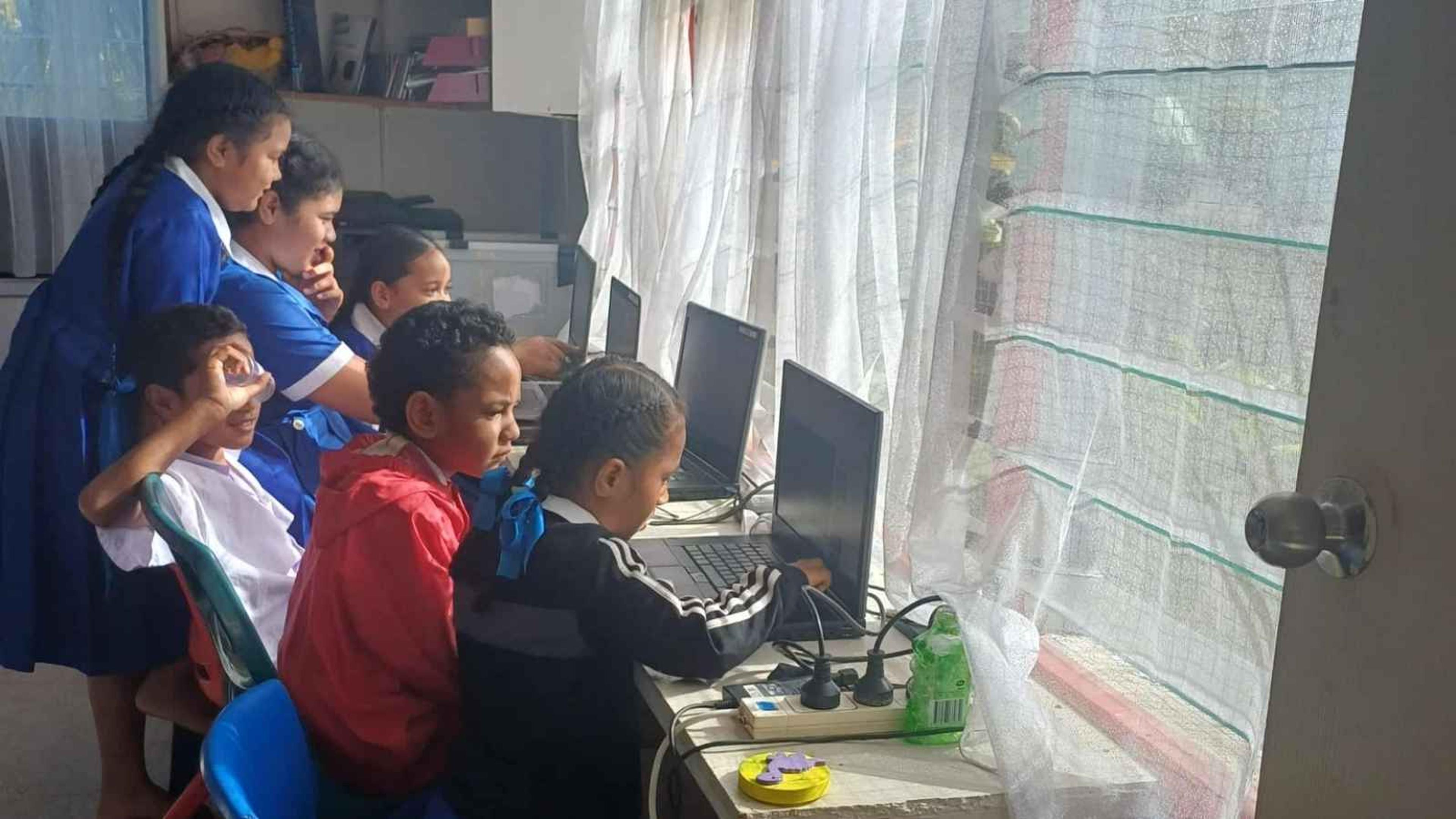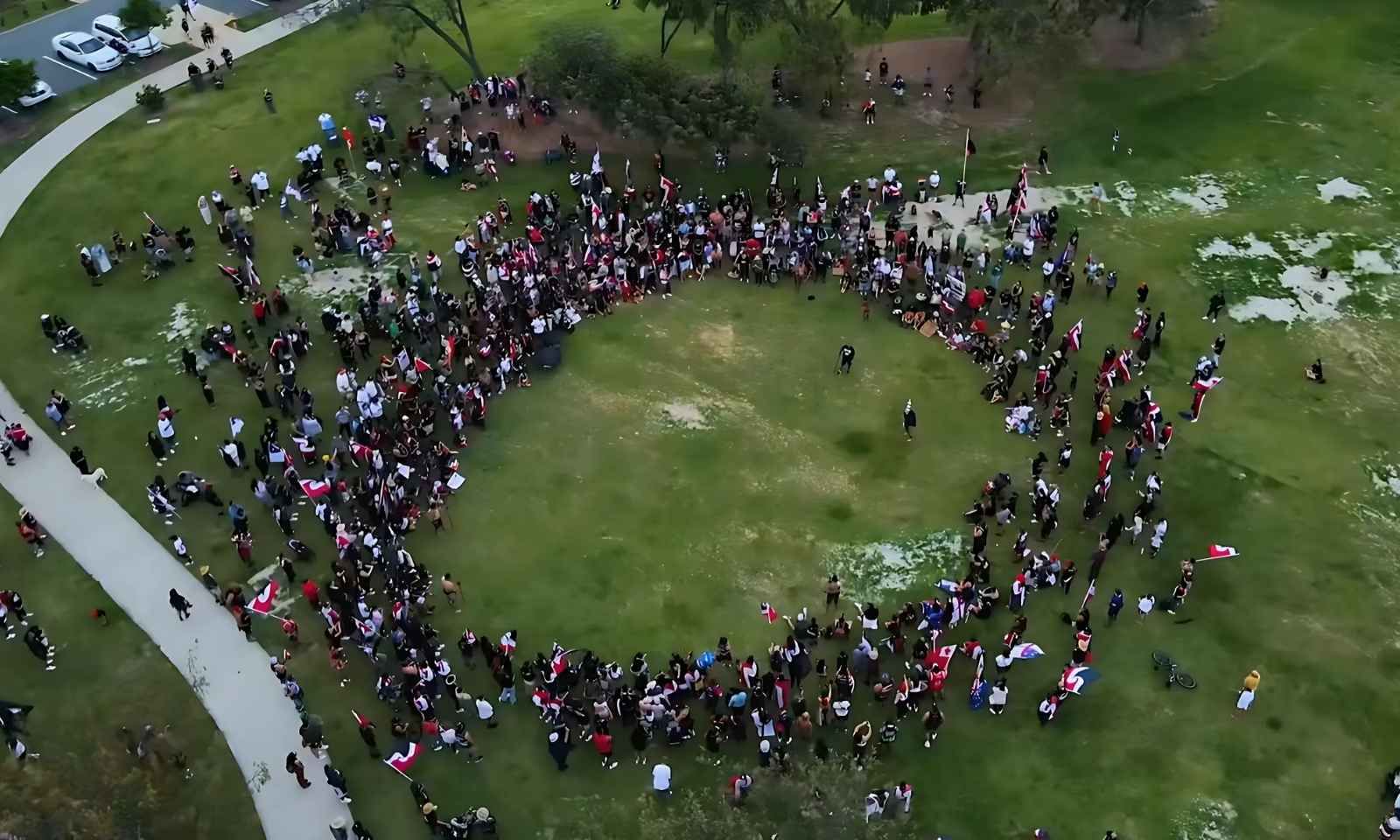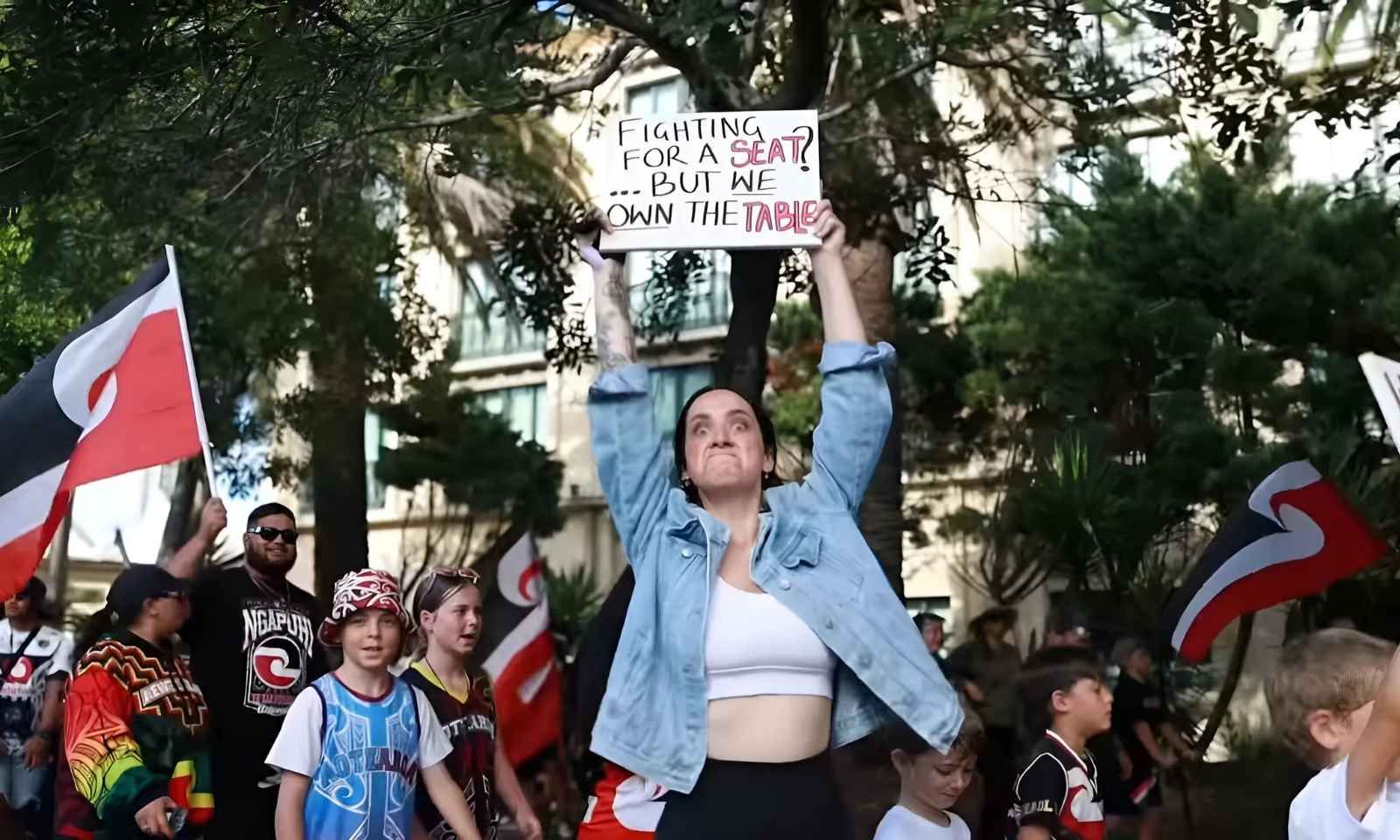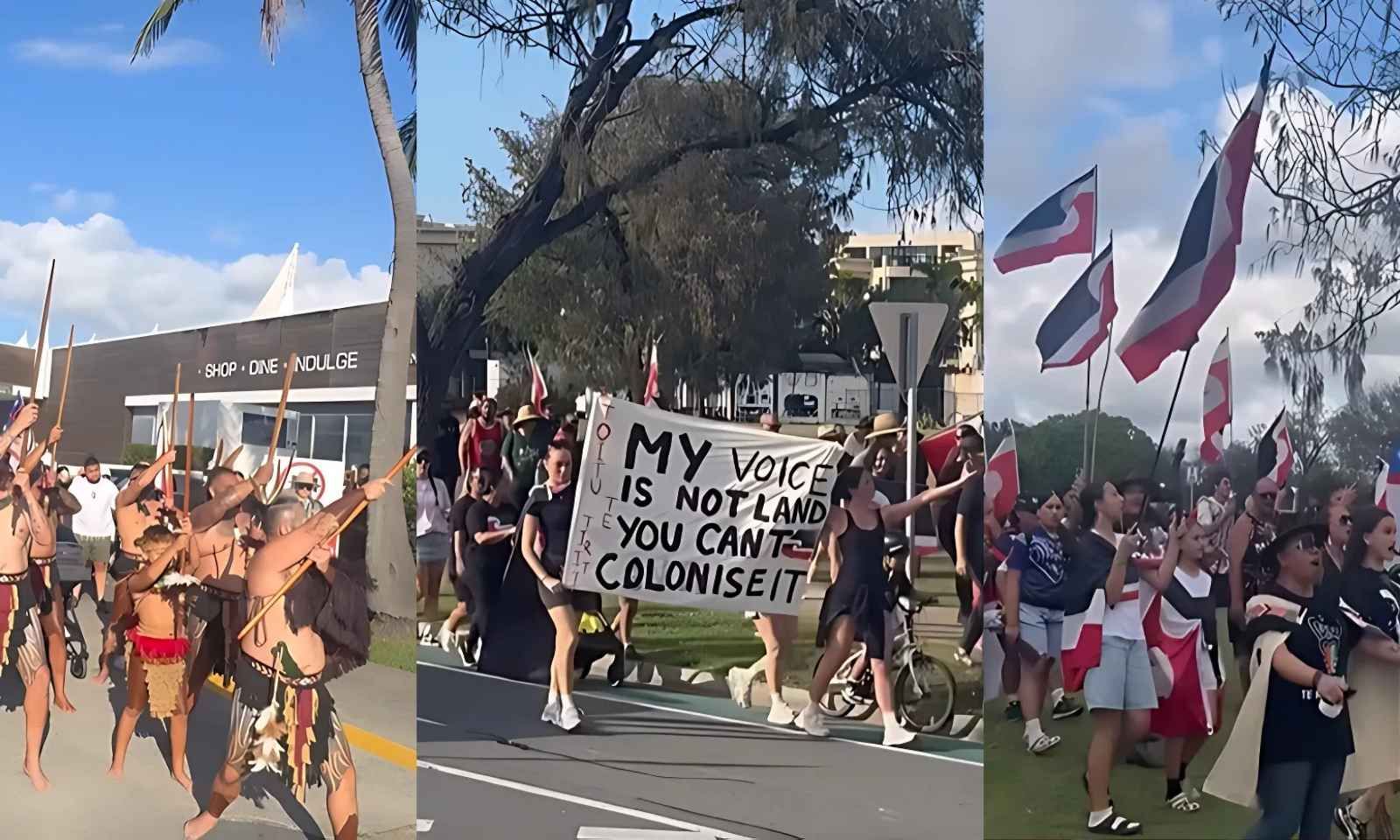

Reportedly with only two days’ notice, the hīkoi mō te Tiriti Gold Coast saw packed crowds show up in solidarity.
Photo /Facebook/Thomas Wheto.
Hīkoi mō te Tiriti: The movement that spanned oceans to protect a treaty
Protests across Aotearoa, Australia, and the Pacific demonstrate widespread opposition to the Treaty Principles Bill, calling for aroha and unity.


Tonga makes historic breakthrough at Oceania Youth Chess Championship

‘A Library for the Heart of Tonga’: Building a hub for Nuku’alofa

Mental health targets risk hiding Pacific people in crisis, expert

‘I knew something was wrong’: Pacific children miss out on early hearing support

Tonga makes historic breakthrough at Oceania Youth Chess Championship

‘A Library for the Heart of Tonga’: Building a hub for Nuku’alofa

Mental health targets risk hiding Pacific people in crisis, expert
Communities in Australia are joining forces with Aotearoa New Zealand for the hīkoi mō te Tiriti, with some participants crossing state lines to oppose the contentious Treaty Principles Bill driving this movement.
An estimated 42,000 gathered in Wellington on Tuesday for a hīkoi opposing the Bill, which aims to redefine the principles of the Treaty of Waitangi Act.
The protest began over a week ago in the Far North and south of the country and culminated in a march from Waitangi Park to Parliament.
In an interview with PMN senior journalist Khalia Strong, Dr Levi Fox (Ngāti Porou, Tūwharetoa), a lecturer at Griffith University on the Gold Coast who focuses on mental health and social work in both Australia and Aotearoa, discussed the significance of the hīkoi.
"We've gathered down at the Gold Coast [on Monday], and we've been marching," Fox said.
"We've had people coming from near and far, all the way from Brisbane. We've had people bringing their aroha, their waiata, their haka.
"Everyone from near and far has just been coming to support the cause and to show our aroha for our whānau in Aotearoa as we navigate this time."

The Gold Coast crowd showed up and showed out. Photo /Facebook/Thomas Wheto.
Beyond the Trans-Tasman
Over 170,000 Māori live in Australia, accounting for 20 per cent of the total Māori population. As Fox emphasises, this highlights the importance of maintaining cultural connections, regardless of physical distance.
Protests have also taken place beyond the Trans-Tasman area, with hundreds gathering in Niue and Rarotonga to support the hīkoi.
Various celebrities have also publicly expressed their support, including Coldplay lead singer Chris Martin, Academy Award-winning actress Octavia Spencer, Grammy-winner neo-soul artist Erykah Badu, and renowned actor Jason Mamoa, who shared a petition calling for the end of the Bill.
Scenes from the ground:

Screengrab of Thomas Wheto's coverage of Gold Coast's hīkoi on Facebook. Photo /Facebook/Thomas Wheto.
'Insincere and pathetic': Hipkins scathing response
Associate Justice Minister David Seymour, who is also the architect of TPB, acknowledged the hīkoi and waved at the protestors.
He later told RNZ that the hīkoi does not represent New Zealand, saying that the "overwhelming" majority of New Zealanders at work and school will engage with and debate the issues surrounding the Bill in their own way.
Speaking to William Terite on Pacific Mornings, Labour leader Chris Hipkins criticised Seymour's conduct during the hīkoi, calling his brief appearance "insincere and pathetic".
"He walked along, hugging the Parliament building effectively right at the very back, surrounded by police, [and] stayed there for less than five minutes and then left again," Hipkins said.
"He certainly made no effort to listen. He basically walked out and said, 'If I can't speak, then I'll make my social media video, and I'll leave again'.
"Not since the Springbok tour have we had a government that's actually tried to deliberately divide the country."
Hipkins said the TPB is deliberately designed to create division, resentment, fear and anger and that Māori continue to face unequal treatment in New Zealand and are "far from having special treatment".
Watch Chris Hipkin's full interview via 531pi's FB below:
Over 180 years of Te Tiriti breaches
Fox highlighted the issue of "whiteness" that permeates New Zealand's government, driven by a history of racist rhetoric that leads to a "blindness to what's going on".
He said there had been numerous breaches of Te Tiriti since its signing in 1840 and emphasised the difference between the reo Māori and English versions of the Treaty.
"How do we identify the impact of the breaches? Go and talk to the person that's sleeping under the bridge, visit the jails and visit whānau that are sleeping in shelters," Fox said.
"They're the manifestation of soul wounds. This is what we see daily as a result of the impacts of the breaches of Te Tiriti.
"Our people are suffering out there at the hands of a government, which is in many ways racist and tyrannical."
Fox said there is a lack of understanding from non-indigenous perspectives and suggested a need for greater responsiveness and collaboration.
"What I mean by that is we need to have our say at the table and our values need to be honoured in that way," Fox said.
"And one way of doing that is by being collegial, by being collaborative with us, and by being indigenous with us.
"Which means that they can be relational with us and get an understanding as to where we're coming from with our traditional values moving forward."

Hīkoi mō te Tiriti - Gold Coast. Photo /Facebook/Lakesha-Lee Taurima-Howe.
'Our Pasifika whānau, stand strong with us'
Fox encouraged Pacific communities to unite, urging "our Pasifika whānau - stand strong with us".
"Our Pasifika communities can help with our whawhai - or our fight - by being present with us.
"As Kiingi Tuheitia said, 'Māori all day, every day', but at the end of the day is his message, which was one of kotahitanga, which means we all come together.
"Pasifika all across the motu, all across Oceania, coming together with us in our whawhai at Parliament."
Watch Dr Levi Fox's full interview via 531pi's FB below: